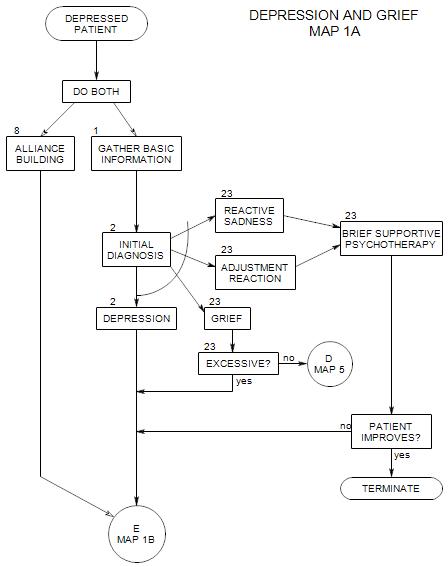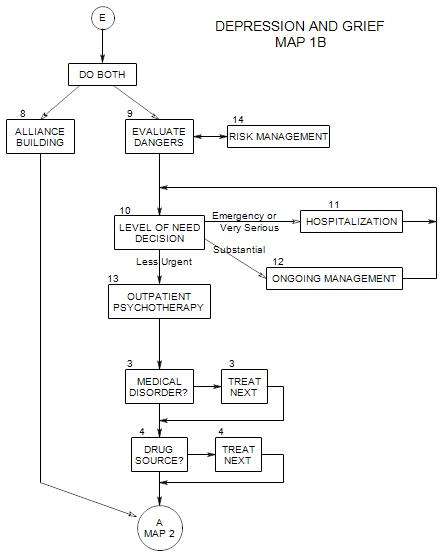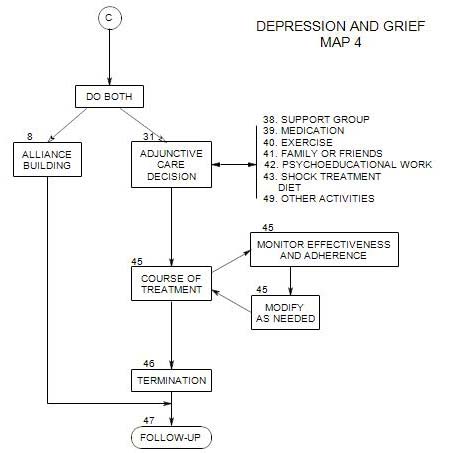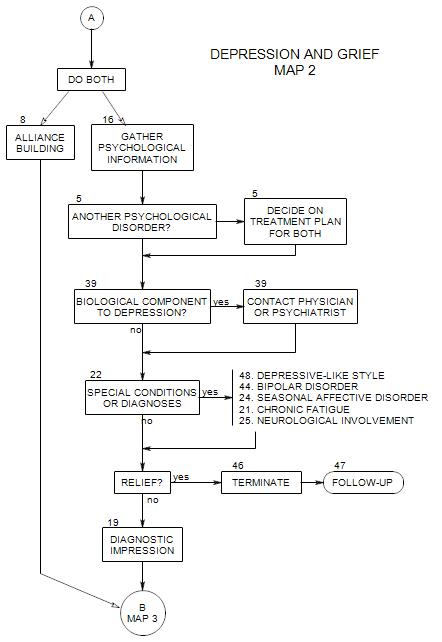
SECTIONS: 5 | 8 | 16 | 19 | 21 | 22 | 24 | 25 | 39 | 44 | 46 | 47 | 48
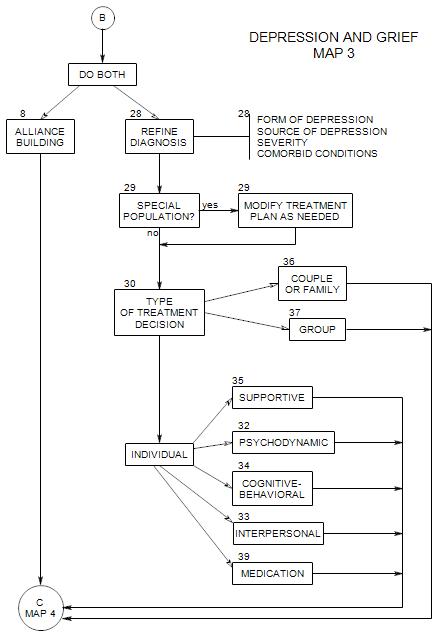
SECTIONS: 8 | 28 | 29 | 30 | 32 | 33 | 34 | 35 | 36 | 37 | 39
-
Follows Section 28 on Map 3
For certain identifiable subgroups of patients, diagnosis and treatment may need to be systematically altered in order to meet their special needs. Known groups [which vary in their identifiability, psychological homogeneity, and degree of difference from the general population] include…
- children, adolescents, the elderly
- gays and lesbians
- women, men
- people in sobriety
29a. People in sobriety
People who have a history of drug or alcohol misuse but who are now sober…
- may already have adjunctive care
- may be at greater risk for depression, because their former drug dependency may have both masked and treated depression, which is now more obvious and unchecked by the drug.
- may have complications regarding the kinds of medications they can safely take
People who are actively abusing a substance may be at greater risk for depression, because their drug of choice contributes to depression chemically [often in the hangover phase], and by its financial, legal and social consequences.
29b. Women and Men
ISSUES COMMONLY OF GREATER SIGNIFICANCE TO WOMEN THAN TO MEN
Some of the major concepts used in theories of depression such as attachment, loss, dependence, and self-esteem need to be reexamined from a woman’s perspective. The relatively new research into women’s development focuses on the connection between definition of the self and orientation toward relationships. This relational self differs significantly from the autonomous/separated ‘healthy’ individual described by traditional theories. A woman’s healthy capacity for intimacy, a hallmark of adult maturity and health, is frequently held up in our culture as a weakness. Therapists need to be aware to not necessarily look at depression as stemming from ‘inadequate separation’ or excessive dependency’.
Women often become depressed over…
- disruptions or conflict in close relationships
- violence or fear of violence
- economics
- dual careers
- conflict over gender role expectation
- body image
- aging
- marital status
- physical or sexual abuse
- unequal treatment in the workplace
ISSUES COMMONLY OF GREATER SIGNIFICANCE TO MEN THAN TO WOMEN
Men may be depressed over loss of an ideal or an achievement-related goal
- performance issues
- being manly enough
Men’s depression may be exacerbated by lack of awareness of need for intimate relationships
- difficulty finding social support
Men are more likely than women to
- deny their emotions, especially any that imply weakness
- attempt to self-medicate, often with alcohol
- hide their feelings with irritability
29c. Gay and Lesbian Clients
Gay and lesbian clients face different conflicts and potential depression, depending on the extent to which their sexual orientation remains secret, nondisclosed, or closeted vs open or out.
SOME ISSUES OF UNDISCLOSED GAYS AND LESBIANS
- Conflicts between behavior and values
- Feelings of isolation from both gay and straight communities
- Lack of social recognition or support following the break-up of a relationship, or the death of a partner.
- stress and strain involved in remaining closeted (i.e., editing all verbalizations, not forming friendships for fear of being outed, etc.).
SOME ISSUES OF OPENLY GAY AND LESBIAN CLIENTS
- Job discrimination
- Loss of housing or employment due to sexual orientation
- Loss of familial support following coming out
ISSUES IN THE PROCESS OF COMING OUT
Clients who are experiencing a sexual identity crisis, or are in the first stages of coming out (questioning their sexual orientation), may appear at times to exhibit mood swings, hyperactivity, and impulsive behavior similar to mania.
Helping clients work through the issues of normalizing and exploring their sexual identity, and if warranted, supporting them through the stages of coming out is vital.
29d The Elderly
May be especially
- vulnerable to losses: of loved ones, of physical health, strength, and financial stability
- prone to depression induced by physical, hormonal or neurological consequences of the aging process
- vulnerable to depression as a side effect of medications used to treat other aspects of ageing
- likely to misinterpret depression as normal signs of ageing
- embarrassed or ashamed of their inability to continue to meet former family responsibilities
29e. Adolescents
Depression may be expressed by adolescents directly or through acting-out or rebelliousness, and interpreted by adults as delinquency.
29f. Other Populations
Whenever you deal with a racial, ethnic or cultural minority, it is important to explore the common issues faced by people with similar backgrounds and to look for different ways of expressing depression or managing it.
